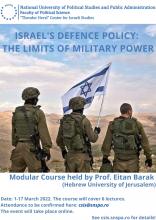ISRAEL'S DEFENCE POLICY: THE LIMITS OF MILITARY POWER (2022)
The content of the course will focus on Israel's National Security Policy in its broadest sense. In the first part of the course, we will review Israel's ongoing and unique geostrategic predicament, together with the effect of that predicament on Israel's notions of national security. In the second part, we will focus on the strategies and options which Israel has chosen to either solve its
predicament without directly settling the conflict (strategic alliances, conventional armament, and implicit nuclear deterrence) or mitigate it (i.e., limited security regimes, confidence and
security-building measures, arms control). The final subject to be discussed is the appropriateness of Israel's security paradigm to a nuclear the Middle East, the feasibility of
replicating the Cold War balance of terror in the region, and whether such an attempt would embody a hazard or solution. The appropriateness of Israel's security paradigm to the opposite
course of actions, i.e., joining a WMD Free-Zone in the Middle East, is to be discussed as well.
The course will be taught by Prof. PhD. Eitan Barak (Hebrew University of Jerusalem). Prof. Eitan Barak is specialized in the law of weaponry, security regimes, and arms control and disarmament, mainly in the Middle East.
SNSPA's BA Students attending a minimum of 80% of the classes will receive credits. Attendance is to be confirmed at csis@snspa.ro.
The course will take place from 1-17 March 2022, online on the Cisco Webex platform in the following format:
- Tuesday, March 1, 10:30-13:30
- Friday, March 4, 10:30-13:30
- Tuesday, March 8, 10:30-13:30
- Friday, March 11, 10:30-13:30
- Monday, March 14, 10:30-13:30
- Thursday, March 17. 10:30-13:30
Remarks: The modular course was held by Prof. Eitan Barak from the Hebrew University of Jerusalem between 1-17 March 2022. The course was organized online on the Cisco Webex platform with the support of SNSPA. The course involved six online meetings for about 4 hours each. We had 24 students enrolled in this course with an average attendance of 18 students. This event was organized for undergraduate students who could obtain credits as an optional discipline, but it was also open to graduate students or those who were interested. We had Ph.D. candidates and 3 students from other universities among the participants. Although it was an online course, Prof. Eitan Barak made the course very interactive with videos and Q&A sessions, discussing the last news and explaining the implications of the war in Ukraine. The students had to send a final paper to Prof. Eitan Barak in order to receive a grade.

